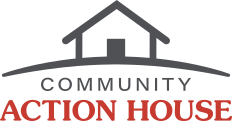May is Mental Health Awareness Month–a time to reflect on the systems, relationships, and community supports that shape mental health outcomes in our community. At Community Action House, we know that life’s challenges are often connected. Struggles with food insecurity, housing instability, financial stress, and mental health can all affect each other—and complex problems call for comprehensive, compassionate solutions.
Locally, the need for mental health support is rising. In 2023, 34.5% of adults in Ottawa County reported having mild to severe mental health struggles (Hill & Sorek, 2024)—almost twice as many as in 2020. This May, we’re reflecting on mental health in our community, and how our work coupled with the collaboration of community partners like Mosaic Counseling is building a stronger, healthier community.
Mosaic Counseling
Meeting Mental Health Needs Across Our Community
As a longtime mental health provider in our community, Mosaic Counseling offers accessible and affordable professional counseling to neighbors facing a wide range of challenges—from anxiety and depression to grief, crisis recovery, and more.
While Community Action House focuses on housing, food, and financial stability, our Resource Navigation team refers neighbors to Mosaic when deeper mental health support is needed. Their skilled team provides the safe, expert care that so many in our community rely on to find healing and hope.
This Mental Health Awareness Month, consider making a gift to Mosaic Counseling! Your support helps ensure that more of our neighbors have access to the care they need to thrive—because healing starts with connection, and community makes all the difference.
Together, we’re building a stronger, healthier community, where neighbors don’t have to choose between taking care of their mental health and meeting their basic needs, because they’re supported on every front.
How Access to Essential Needs Improves Mental Wellbeing
NOURISH
When Mental Health Impacts Food Security
Food insecurity and mental health often go hand in hand. Depression, anxiety, and trauma can make everyday tasks—like grocery shopping or cooking—feel overwhelming. At the same time, not having access to nutritious food can make mental health symptoms worse, creating a cycle that’s hard to break.
At Community Action House, our Food Club and Community Kitchen give neighbors access to fresh, healthy food in a friendly, welcoming space. But these programs offer more than groceries—they foster community, restore dignity, and create moments of connection, all of which are essential for improving mental and emotional wellbeing.
EQUIP
Supporting Neighbors Through Life’s Complex Challenges
Financial stress, unstable housing, and the weight of day-to-day survival can have a big impact on mental health. When basic needs aren’t met, stress and anxiety can take hold—and stay. At Community Action House, we equip guests with tools and knowledge needed to build long-term stability. Whether it’s support with budgeting or navigating housing options, these skills create a foundation for better mental health.
But we also know that healing often requires more than skill-building and community support. The emotional toll of instability runs deep. That’s why we view our work as part of a broader web of care in the community—where every partner plays a vital role.
EMPOWER
A Community Where No One Faces Challenges Alone
Empowerment happens when our neighbors have the support they need to thrive. At Community Action House, we walk alongside neighbors as they set goals, overcome setbacks, and work toward brighter futures. We believe in offering resources and relationships—because no one should face challenges alone.
When mental health is part of the story, feeling empowered also means knowing where to find professional help. And that’s where partners like Mosaic Counseling come in.
When we meet people’s basic needs and surround them with care, we create space for healing and growth. This Mental Health Awareness Month, we’re proud to celebrate the power of partnership, the strength of community, and the shared commitment to ensuring every neighbor can build a brighter future.
References
Abeldt, B. (2024). The Relationship Between Food Insecurity and Mental Health. American Journal of Psychiatry Residents’ Journal, 20(2), 15–17. https://doi.org/10.1176/appi.ajp-rj.2024.200206
Hendryx, M., Green, C.A. & Perrin, N.A. (2009). Social Support, Activities, and Recovery from Serious Mental Illness: STARS Study Findings. The Journal of Behavioral Health Services & Research, 36, 320–329. https://doi.org/10.1007/s11414-008-9151-1
Hill, M., Sorek, J. (2024). Community Health Needs Assessment. https://healthyottawa.org/wp-content/uploads/2024/05/2024_Ottawa_County_CHNA.pdf
Jung, J., Mukherjee, K., Brown, M., Sadigh, G. (2024). Association Between Financial Hardship and Psychological Burden and the Role of Social and Mental Health Support: An Observational Study. Medicine, 103(28). https://journals.lww.com/md-journal/fulltext/2024/07120/association_between_financial_hardship_and.57.aspx






